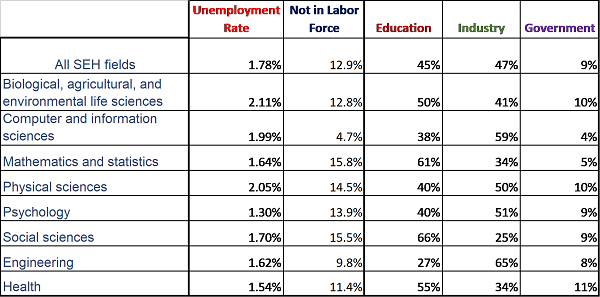
The Economy is humming all cylinders, employers say they can’t find employees with the right skills, yet graduate students report a tough job market. Are Advanced Degrees Taking Students Backwards in Employment?
Employment reports issued by the government and commentary from news outlets over the past year indicate an economy humming on all cylinders and pumping out jobs like a fire hose. Supply chain areas like transportation and logistics have in particular reported robust hiring and some difficulties in finding skilled workers. One the other hand, anecdotal reports from recent masters degree graduates as well as experienced workers in supply chain management indicates a market in which it is still very difficult to gain job interviews. What’s happening under the employment hood? Let’s take a look.
The December 2018 payroll report issued by the U.S. Bureau of Labor Statistics on January 4, 2019 indicated an unemployment rate of 3.9 percent, and the number of unemployed persons increased by 276,000 to 6.3 million. The 1.3 million long-term unemployed accounted for about 1 in 5 of the unemployed. The unemployment rate for workers will less than a high school diploma decreased from more than 14% in 2011 to 5.8% in December 2018, while the unemployment rate for those with bachelor’s degree and higher decreased from nearly 4.5% in 2011 to 2.1% in December 2018.
According to this report, significant job gains occurred in the logistics area including couriers and messengers, and warehousing and storage. Professional and business services also appeared to have gained jobs. The FRED graph at the Federal Reserve Bank of St. Louis FRED website shows the historical trends over the past decade indicating significant growth in jobs requiring a high school diploma or less. The FRED Federal Reserve Site shows a non-seasonally adjusted unemployment rate of 2.1% for master’s degree holders and 1.3% for doctorates in December 2018.
While this is certainly good news for the economy, there are plenty of reports on sites like LinkedIn indicating that graduates with advanced degrees (Masters and Doctorate) in some fields are either struggling to find jobs or are working at jobs far below their qualifications. Rigorous data is scarce is in this area. Data from the National Science Foundation’s 2015 Survey of Doctorate Recipients reveals an unemployment rate for science, engineering and health (SEH) Doctorates is 1.78%, compared to the national average of around 4% at the time.
However, that same report indicated that about 12.9% of the total SHE Doctorates were “not in the labor force” which includes retirees and individuals neither working nor looking for work in the prior 4 weeks. It is noted that this data does not include information on non-SHE fields like humanities, art, and law.

Compiled from NSF Data Employment status and sector of employment of U.S.-trained SEH doctorate holders, by residence location and field of doctorate: 2015
There are numerous graduates, some with two master’s degrees in the areas of engineering or supply chain management, who are either still looking for jobs or are working in entry level jobs which are significantly below their qualifications or talent. This is especially true in the areas of social sciences, humanities, law and some engineering disciplines as well.
There are several universities whose administrations have hired consultants to advise them on strategies and operations. These consultants come from firms like Accenture and Huron that have identified higher education as a high growth area. The job postings for mid-to-senior level consultants and managers from these companies often indicate the following requirements:
- Bachelor’s degree
- 3 or more years of experience
One example is a recent job posting on LinkedIn for a “Higher Education Finance Transformation Consultant” by Accenture. The responsibilities include “Focus on supporting Finance Transformation delivery for education clients; Engage on transformation programs at major education institutions focusing on implementing process and organizational change” and others. The Basic Qualifications list “Bachelor’s degree, Minimum 3 or Higher Education experience, Minimum 3 years of project experience on education Finance Transformation projects, Minimum of 1 year of experience cross functional touchpoints area” and others. This posting does not indicate any value for advanced degrees.
A job posting for a Director by BKD’s National Higher Education Financial Sustainability Services Practice states that bachelor’s degree is required and a master’s or advanced degree is preferred. The posting also required a “Minimum of 2 years of experience in evaluating academic programs with an understanding of the economics of programs,” “Minimum of 7 years of experience working at a higher education institution or a similar academic setting and/or consulting in higher education in a comparable role, and “Proven track record of project management.”
This is particularly interesting as it appears that University administrators want to get advice from consultants with a bachelor’s degree, while the universities are in the business of higher education, and offering advanced degrees presumably of some value. Many of the universities have business schools or departments which often offer MBA and doctoral degrees, but the administration would rather hire external consultants with bachelor degrees rather than ask their own business school faculty for consulting services.
The plight of many doctorates who are barely making ends meet, often as “adjunct faculty”, has been well-documented. Laura McKenna, in an article in The Atlantic, references the NSF report, “The Survey of Earned Doctorates,” which concludes that many doctorates complete their degrees “with significant debt and without the promise of a job”. It could be argued that the bachelor degree consultants have convinced university administrators that they could benefit significantly by converting their large fixed-cost tenure-track or tenured faculty into variable costs, i.e. adjunct faculty with per-course contracts and no overhead benefits. There are plenty of doctoral degree holders working in jobs which could be done by workers with must lower levels of education.
Are years of University education interchangeable with work experience?
If that’s the case, then students should go from high school to a trade school and enter the workforce as soon as possible. On the other hand, it could be argued that higher education not only provides a broad set of skills but also trains students on knowledge based on rigorous research. In social sciences, advanced degree students examine the subject matter in depth, using rigorously developed models and eventually develop and test their own models. On the other hand, each workplace has its processes, and, in that context, work experience can be rather limited to that particular work situation or environment. Experience gained in one job might not easily transfer to another one, while knowledge gained through higher education can be applied broadly.
By devaluing advanced degrees and emphasizing “work experience” are organizations emphasizing the copycat philosophy of doing what other organizations are doing? In this process they might be missing the potential of advanced degree students who have a broader knowledge base and the ability to construct and test different processes and lead the organization towards greater process and product innovations.
How should society make the best use of its talent? If a person puts in many years of study and then cannot find an employment that makes the best use of that education, can it be put down to the person’s poor choice of the field or degree, or is society at large partly responsible? Where would we be, as a civilization, if we made the best use of all the talent that exists? Managers and leaders can lead the progress by hiring the educated and giving them the freedom to innovate and make the best use of their talents.
Source: Modern Materials Handling



